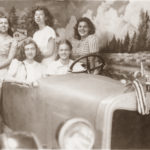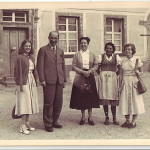I meant keep myself out of the project. This, I announced to myself, would not be a series of scenes about Europe, 1949 interspersed with, example, parallel or significant scenes from my life. Nor did (and do) I want to expend space meditating on my emotional responses to my experiences. But, on my first day in London, I realized that some of my experiences may well fit into this project, because they would be events in themselves. I arrived, after all, during the London riots, and one of the first things I heard was the predictions that the riots would be coming in the center of Putney, a short jog from the hotel where I was staying.
So this first post will be about me.
Actually, the prospect of the riots didn’t bother me at all. I’m accustomed to riots occuring in pockets of deep poverty in and around cities, and Putney appeared to be a fairly prosperous area. Only later that day did I find out that these riots were an exception–specifically targeting more affluent and well-trafficked areas of London and its near suburbs. Apparently it’s all the fault of Blackberry with its anonymous instant messaging service. During my stay, there were a few newscasts and newspaper articles suggesting that all would be well without Blackberrys.
So, on my first night in London, still in that hazy, foggy, jet-lagged brain, and with the news that most of Putney would be closed off, I went in search of a restaurant.
I was supposed to dine with Tita Sandoval-Eisler–our one chance to get together in my infrequent stops in London. This was, after all, August, and it was a dazzling exception to find one of my friends in London. (I eventually found two–the rest were scattered in Switzerland and more exotic locales). Tita lives in Kensington–an easy drive or underground trip from Putney. But, again, the riots. Tita had noticed that the Hugo Boss store in Sloane square had had its glass windows destroyed by a gang of hooligans (the rioters had clearly not targeted areas of poverty), and Tita was worried that I might put myself in danger by coming into London. People, Tita added, are getting tired of the rather passive response of the police, who have been ordered to cordon off riot areas, but not to take aggressive action against rioters whose only destructive acts are pillaging and looting stores. So, tonight there is a rumor that the police are getting out their rubber bullets.
It occurred to me much later that Tita and I missed a parallel to the 1949 trip. That trip was about the encounter of four women–two from Cuba, one American and one Iraqi. And here I would have had one day in which I, an American would have spent the day with two Iraqi women–one of whom had been on the trip with my mother, and one Cuban friend.
So, on my first night in the London area, I go off in search of a restaurant. And now I’m feeling a bit stressed because the only restaurants I find are a block from the area where they are predicting riots, and the fact that a number of restaurants near the area are closed adds to the stress–not to mention the fact that I’m jet-lagged. But I find a nice-looking Italian restaurant that is open called, quite uninventively, La Strada (I don’t recall any Fellini posters in the restaurant, but they must have been there). I deal with stress and jet lag by eating, and I’m delighted to find that the staff at La Strada prepares a fine spinach, avocado, bacon, and parmesan salad. It’s the kind of bacon that Charles and I both love–not slightly rare and glistening with fat, but crisp and cooked–with a nice homogenous toasty color and a statisfying crackle with each bite. That, with a glass of wine, bread, and a dark, glossy look means that this is the familiar kind of restaurant that I am drawn to when I dine alone–a culinary home away from home.
And I’m discovering a bit about Putney in the process. I have to say that the name didn’t promise much. I’m not sure what it resonates with, but it sounded like some sort of dull backwater place making a semi-desperate attempt to get itself out of its dull existence. But, in fact, the tables around me suggest that it’s the living space for a number of young, energetic, and diverse young professionals and their like. The three women in the next table–obviously close friends, given the amount of eager interruptions and additions to each other’s conversations–are discussing mothers, food, healthy eating, and clothing. I am in a scene from Bridget Jones’s diary, only these women seem to be well in control of any weight issues.
I relax further when I realize that the waitress, who is recently here from Spain, didn’t even know there were supposed to be riots in the area.
* * *
The arrival was perhaps the most routine, unproblematic arrival I’ve ever had in Europe–Heathrow, at least, didn’t seem terribly concerned about riots. The extensive walk from the airplane to customs felt like a brisk mini-aerobics, with slight pauses to get my luggage and to have a quick chat with the Customs person, who clearly found me to be of no interest, then practically a sprint (as the people behind me seemed to press forward in eagerness) through the “Nothing to Declare” passageway. About 30 seconds of minor concern passed through me as I scanned the crowd, which appeared as a faceless, multi-colored blob, then one more glance around, and there was Anissa. I was a bit anxious I might not recognize her, but there she was–exactly the same person I had met at my mother’s a few years back–the same beautifully and perfectly swept-back hair, pulled-together look, but with a slightly worried expression, since she was still looking for me. It had been a long time since I had had anyone greet me at an airport in Europe, and I had not wanted Anisa and Tala to put themselves out by coming to see me, but, I have to say it was great. A moment later we found Tala (who had been looking for me at the other end of the exit line). I had only met Tala once–back in 1972 in the south of France (I’m still trying to find the photos), but I recognized her immediately, with her radiant smile and long black hair.
***
The three young women have brought the conversation back to food: I feel such a strong kinship with them, even though I seem to be invisible to them. One–the most attractive, vivacious, clearly the “leader” of the three, is catching her friends up on her recent trip to see family in India. The subtext is that she is too British, and probably too thin, to return to India. “All they did was try to force food down me; and, honestly, it’s all deep fried, just chunks of deep fried food being pressed on me. And my father saying I have to be polite; I have to eat everything they put in front of me. Look at me, honestly, can I eat that much food?” She is very slim. “I couldn’t take it any more. I finally said to Dad, ‘Dad, I can’t take it any more; I’m getting ill.’ So Dad announced to the group”That’s it; she is not eating any more. They were all right after that but after that I mainly go together with relatives for non-meals.”
***
Anissa and Tala took me straight to the Costa in the airport, bustling and full of clattering sounds of cups and plates, but it was nice to sit down in a chair with leg room and chat and begin to wake up. The generous amounts of coffee (really not bad) in the airplane had not quite had their effect, and my body still seemed to think that it was sleeping in Wooster, OH. But right away I was able to hear fragments of stories from Anisa–fragments that she turned the next day into longer narratives. She began with her own tale of the opposite journey–the long trip from Iraq to the United States, with an extended stay in England as she was trying to find a boat to get her to the States. She mentioned, too, the Rembrandt Hotel–one that my mother also talked about a lot. This, I remembered, was the scene of the famous chamberpot incident, and I momentarily pictured Joan–slight, pixiesh, and mischievous–handing a clean white porcelain chamberpot filled with cherries to Abuelita, and Abuelita’s look of horror and her exclamation, “But Joan, this is a chamberpot!”
And I remember a comment David Wiebe (a Wooster friend) made when I bumped into him in the drug store, right after he had returned from a year in Berlin. When I told him about the summer in Europe he exclaimed, “Wow, that was when Europe was just getting out of the postwar crisis; they must have been among the first American tourists to come to Europe after the war.”
Joan is rapidly becoming the Puck figure of the story–the one with the mischievous take on things, the one who tramps through European customs but whose positive and energetic presence keep people from feeling insulted by her naive Americanisms. She is the one who tried to go through Germany without eating potatoes and through Austria without having a pastry.
***
The women in the next table are their own energetic international community. The one from an Indian background is very attractive, chic, thin, in a sleek black outfit. One friend is Afro-British in boho chic–red sneakers, leggings, a little crocheted top, thick black glasses, a thin blue headband, and gold hoop earrings. Somehow it all comes together into an elegant, sassy look. The other friend is a sweet white–very pale–woman. She speaks like Juliet Stevenson in the film Truly, Madly, Deeply. She is the quieter one, who never seems to initiate a conversation, but always eagerly follows the patter between the two other women and jumps in when she starts getting very excited. She seems to be simply basking in the delight of having these friends. Hers is the drabbest look–basic greenish pants and a good old white top and a plain pony tail. The Anglo-Indian woman dominates, vivaciously, to the end, her intonations reminding me, oddly, of Stephanie Trigg, the Australian professor who is writing a book on medievalism with Tom.
I walk back to the hotel, turn on the TV to watch news of the riots. Nothing has happened–no riots in Putney. Time for bed.



I can’t help noticing that there is a lot of eating here–it’s almost as if travel and food are coextensive.